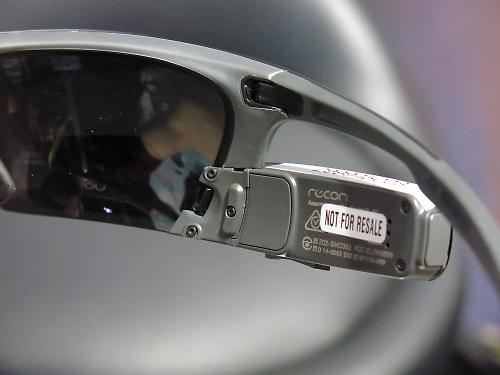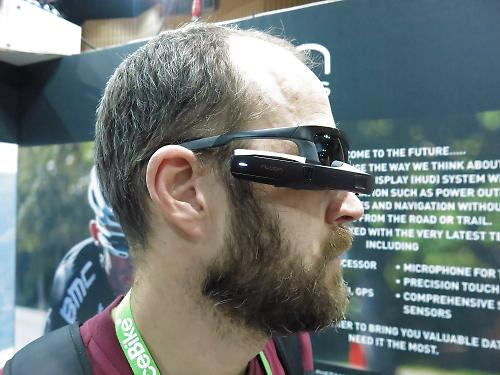- News
- Reviews
- Bikes
- Components
- Bar tape & grips
- Bottom brackets
- Brake & gear cables
- Brake & STI levers
- Brake pads & spares
- Brakes
- Cassettes & freewheels
- Chains
- Chainsets & chainrings
- Derailleurs - front
- Derailleurs - rear
- Forks
- Gear levers & shifters
- Groupsets
- Handlebars & extensions
- Headsets
- Hubs
- Inner tubes
- Pedals
- Quick releases & skewers
- Saddles
- Seatposts
- Stems
- Wheels
- Tyres
- Tubeless valves
- Accessories
- Accessories - misc
- Computer mounts
- Bags
- Bar ends
- Bike bags & cases
- Bottle cages
- Bottles
- Cameras
- Car racks
- Child seats
- Computers
- Glasses
- GPS units
- Helmets
- Lights - front
- Lights - rear
- Lights - sets
- Locks
- Mirrors
- Mudguards
- Racks
- Pumps & CO2 inflators
- Puncture kits
- Reflectives
- Smart watches
- Stands and racks
- Trailers
- Clothing
- Health, fitness and nutrition
- Tools and workshop
- Miscellaneous
- Buyers Guides
- Features
- Forum
- Recommends
- Podcast
TECH NEWS
Hands-on with the new ReconJet smart glasses, available soon
ReconJet's smart glasses are finally launching this spring, with a retail price of £579.99. The glasses have been two and a half years in development, we first reported on them back in 2013, and they were originally meant to be launched last year, but Recon Instruments pushed back the launch date so they could ensure the glasses were properly ready for the world. Well now it seems they're ready, and we've had a play with them.
At the company's UK distributor trade show recently, we had the chance to try them out for the first time. There's a lot of development in the wearable tech market, with Intel launching smart glasses and tech giants like Apple and Samsung developing smart watches, but the ReconJet's are the only cycling-specific smart glasses out there at the moment.
So what are they?
Here's what ReconJet has to say about them: "Recon Jet is a smart eyewear device for sports that unobtrusively delivers relevant information at a quick glance. Jet features a powerful computer and a full-colour widescreen display designed for active outdoor use, mounted on high-performance eyewear."
The key feature to the ReconJet is a small pod that projects a screen below your sight line. This screen can be used to present any sort of data you want, anything your traditional cycling computer or smartphone might ordinarily display. You can pair the ReconJet with a smartphone and use the app to export the data, or you can upload your activity directly from the glasses, using the onboard wifi, to a computer to share on Strava or a similar training website.

The glasses have integrated GPS and can be synced to various heart rate, power or cadence sensors using Bluetooth or ANT+. There’s also a 720p video camera so you can capture highlights of your ride. That array of sensors can allow you to do some potentially cool stuff. You could, for example, use them to stream video from a bike mounted camera, say attached to the seatpost, and have that video playing in the glasses. That might be useful for cycling through busy city streets for example.

An optical sensor on the side of the ReconJet navigates you through the various menus. The screens position can be adjusted by twiddling a small joystick poking out under the ReconJet. It’s quite intuitive to use and after a few minutes you get the hang of it.
The glasses have a rugged build, they’re clearly designed to handle a few bumps, and an IP65 rating provides some protection from water immersion or more importantly, use in the rain. The nose piece is removable and easily adjustable, and there are plans for prescription lens compatibility in the future, and there will be four lens tints available at launch. The ear stems are also easily adjusted to help achieve a comfortable fit.
What are they like to use?
Dave Atkinson had a play with a pair and here are his thoughts on the glasses after a brief demonstration:
A show hall isn't the best place to get a full understanding of what a product is like, by any means. But we can certainly say that the system works, and actually the resolution of the screen and the visibility of the data is pretty impressive. You can adjust the position of the HUD image pretty easily with the joystick; it remains to be seen whether it'll stay put when you're out on your bike on rough tarmac. Swiping through the screens, and using the other controls, is fairly straightforward. It felt a bit clunky at first but new interfaces always do, and I'm pretty sure you'd quickly get used to it.

The camera capture mode feels a bit odd when you're presented with a smaller version of what you're already seeing in the bottom corner of your vision, but again, it works. Recon like to trot out the line that looking at the screen is like watching an 30-inch from seven feet away. In terms of focal length that's maybe true but the WQVGA (400x200) screen can't convey fine detail information. It's a similar resolution to the Garmin Edge 1000, so in terms of mapping and data display you can expect the same sort of density of data. I've navigated roads I don't know with no problems on the Edge, so that bodes well for the Jets.

The main sticking point for me is battery life. It's stated four hours, meaning you're likely to get three. Okay you can carry spare batteries and swap them out, but even for something as mundane as a 100-mile sportive you're looking at three batteries to guarantee you'll make it round. And that has implications for your ride data too, no-one wants to be stitching rides together once they get home.
It's worth pointing out that if you're short-sighted, and remove your glasses to put the Jets on as I did, the screen will look like it was as if it was seven feet away, ie out of focus. If you have contact lenses then you're fine, otherwise Recon are working on a prescription insert which will be available some time after launch.
More info on availability soon, and you can find out more at www.reconinstruments.com/products/jet/
David worked on the road.cc tech team from 2012-2020. Previously he was editor of Bikemagic.com and before that staff writer at RCUK. He's a seasoned cyclist of all disciplines, from road to mountain biking, touring to cyclo-cross, he only wishes he had time to ride them all. He's mildly competitive, though he'll never admit it, and is a frequent road racer but is too lazy to do really well. He currently resides in the Cotswolds, and you can now find him over on his own YouTube channel David Arthur - Just Ride Bikes.
Latest Comments
- bensynnock 13 min 5 sec ago
201 Do not reverse from a side road into a main road. When using a driveway, reverse in and drive out if you can. It isn't difficult.
- ChrisA 44 min 1 sec ago
Just seems like a general lack of consideration; less regard for (what were) social norms - everything from rubbish to rubbish driving....
- Jakrayan 56 min 6 sec ago
By the same token, if you were a doctor working in the A&E department of a London hospital, what would you say to the parent of a child...
- dh700 1 hour 1 min ago
Not with the materials that are used in bicycle construction. In order to make a double-triangle frame vertically flexible during use as a bicycle...
- mdavidford 1 hour 22 min ago
This is going to give cross people something else to hang their crossness on.
- dh700 1 hour 30 min ago
All of the reduction in Sweden's road fatalities predates their adoption of Vision Zero -- which has made no difference whatsoever in the past...
- Rendel Harris 1 hour 43 min ago
You are Marcus Wallmeyer and I claim my €5.
- RedJohn 2 hours 25 min ago
You're kidding, they've reinvented toe clips and straps 🤣
- David9694 2 hours 47 min ago
Drivers will no doubt be working their way through their usual set of excuses why there can't be a 20 mph limit, but why - in the absence of any...
- Spangly Shiny 3 hours 31 min ago
Was never on the CW forum, but now that the BikeRadar forum has folded there may just be a few inflatables migrating from there in the near future.












Add new comment
15 comments
Nice one, but doesn't looks safe to me.
That's a hefty lump to smack against your cheekbone in the event of a fall.
at that price and such a short battery life id say its back to the drawing board .
at that price and such a short battery life id say its back to the drawing board .
The funniest thing I've seen posted up all week.
Lovely. But they'll be a collector's item within a handful of years. Make hay while the sun shines, lads.
I like the idea of them, but the reality is too clunky and expensive. At that price I will continue to glance down at the Garmin (old skool).
Also, if the lens tints aren't interchangeable, they won't be usable for about 50% of the time in the UK.
Time trials - Keep your head buried and still be able to see where you are going.
I'm stunned it hasn't been used yet.
I so hope this totally connects with Periscope so I can live broadcast the view from my sweaty head to literally no-one in the world and if they could add another camera on an arm like a nose mounted selfie stick that can simultaneously film me and what I'm seeing then that would be even better so I can see what I look like when I'm looking at different things which is really important to me.
What is the problem this fixes? It looks very awkward and as someone else pointed out, it looks like it would get in the way when looking over a shoulder. I hate to knock new things but this just seems unnecessary for most people - pros or track riders where no interaction with traffic, possibly. What happens in a collision, does that front bit get rammed into your eye? Seems like a late April 1st story?
But they still make you look like a knob
How's the visibility if you want to look over your right shoulder? It looks as though the module might block your view a bit (not as much of a problem for countries where they drive on the wrong side)
Exactly my thought. Not sure I'd want anything in that lower right corner for use here in the UK.
I don't think it matters where you ride, blocking your peripheral vision to that extent on either side just seems daft.
Great to see R&D time going into prototypes like this. In a few years when:
a) the battery lasts 12hrs+
b) the tech is invisible
c) it's half the price
I'll consider buying one.